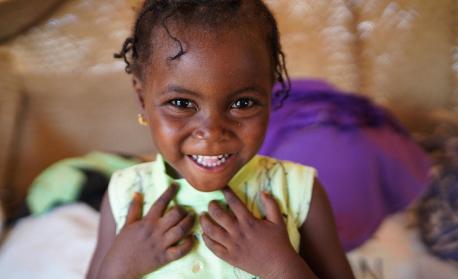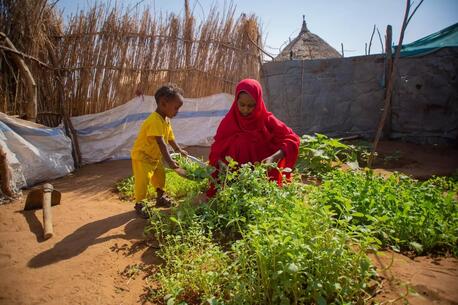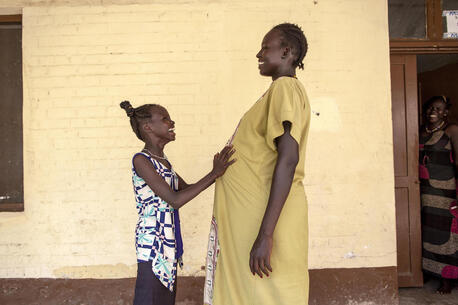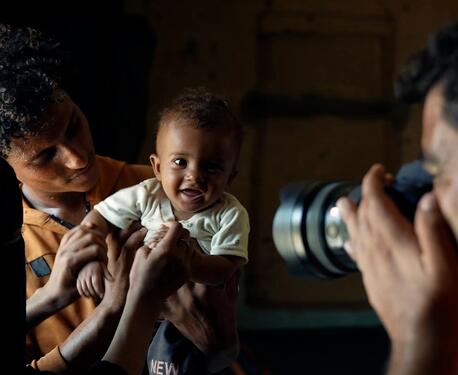
Respond, Recover, Reimagine — UNICEF's Vision for a Post-COVID World
UNICEF issues an urgent appeal for support for its global pandemic response — calling on partners to work together to make sure communities come back stronger, with systems and policies that protect all children, all the time.
Global COVID-19 infections topped 7 million this week, with over 400,000 deaths.
While children are less likely to get sick from the virus, they risk bearing the brunt of the pandemic's social and economic impacts, as health systems buckle, borders close and families struggle to stay afloat. The most vulnerable children — those affected by poverty, exclusion or family violence — are facing even greater risks, cut off from existing supports.
Researchers warn there could be a sharp increase in child mortality, as many as 6,000 more child deaths per day — not from COVID-19 but from preventable and treatable causes like measles, pneumonia and malnutrition — over the next six months, as essential services are disrupted.
As #COVID19 devastates already fragile health systems, over 6,000 additional children under five could die a day, without urgent action@UNICEF launches #Reimagine, a global campaign to prevent the pandemic from becoming a lasting crisis for childrenhttps://t.co/4jBImdBOqL
— Lotte Leicht (@LotteLeicht1) May 13, 2020
UNICEF and its partners are focused on helping low- and middle-income countries avoid these grim projections. But UNICEF's global response plan, estimated to cost $1.6 billion through December 2020, remains woefully underfunded. (For funding requirements and gaps by region and other details, see UNICEF's Humanitarian Action for Children COVID-19 report.)
In its latest appeal for support, UNICEF stands committed to continuing to provide emergency relief and support in fighting COVID-19. But UNICEF is also urging partners to reimagine a post-COVID world that is fit for all children — and to act on that vision. For UNICEF, it is imperative that governments, the private sector, the public sector and young people themselves work together to help communities not only recover from all that the pandemic has wrought, but to build back better; to emerge stronger and more resilient so that every child is safe and protected.
#DYK? 40% of the world's population is not able to wash their hands with soap & water @ home? @UNICEF is working around the clock to provide soap & support families across the --. Help us #Reimagine a healthy world #ForEveryChild. Share what you can https://t.co/y5aOzJlEgwpic.twitter.com/6x3LxbY1sv
— Mohamed M. M. Fall (@MohamedFall) May 14, 2020
For example, it is not enough to provide medicines, nutrition and vaccines to countries in need. Maternal, newborn and child health services must be sustained. There must be equal access to the diagnostics, treatments and vaccines — including those in development. Investments are needed to ensure quality health care that is both affordable and accessible to all. A good place to start, according to UNICEF: train a new generation of young people to be health workers.
Nor is it enough to distribute soap and put up posters demonstrating proper handwashing techniques. Governments must increase their investments in sustainable and climate-sensitive water, sanitation and hygiene services for their citizens.
@UNICEF continues today the distribution of life-saving supplies that will reach more than 340,000 vulnerable people – mainly #children – to protect against the spread of #COVID19 and other diseases @RanaUnicef@UNICEF_EAPRO#ReImaginepic.twitter.com/uJ3p6LhO34
— UNICEF Viet Nam (@UNICEF_vietnam) May 27, 2020
In education, UNICEF and partners is providing advice and support to parents, caregivers and educators to enhance home and remote learning, while also advancing innovative solutions such as the GIGA initiative, which aims to connect every school to the Internet. UNICEF is also advocating for governments to scale up home learning options, including no-tech and low-tech options, and to make greater investments in equitable, quality education and skills development.
And considering that there are 250 million children living in areas under conflict, UNICEF has joined the UN Secretary-General's call for a global pandemic ceasefire to lay the groundwork for a durable and lasting peace.
Help prevent the COVID-19 pandemic from becoming a lasting crisis for children. Join UNICEF as it reimagines a world that is fit — and fair — for every child.
Top photo: Chimaou, 3, is under quarantine with her family at a site for returning migrants in Niamey, Niger, where UNICEF is providing safe water, sanitation and hygiene supplies and services to assist in the fight against COVID-19. UNICEF is working with the Niger government and other partners to shore up the emergency response in the country as it continues to contend with the fallout from other crises that pre-date the pandemic, such as malnutrition, exacerbated by conflicts and natural disasters. © UNICEF/UNI331388/Haro


